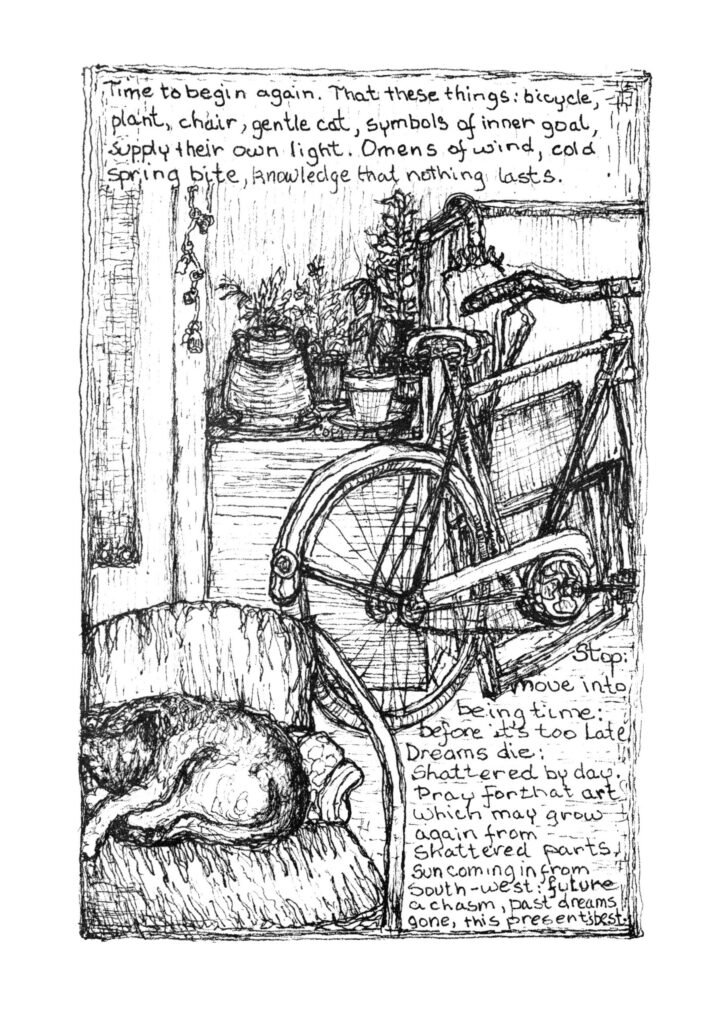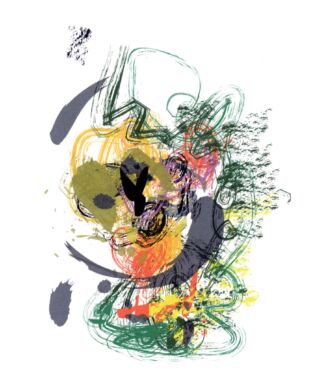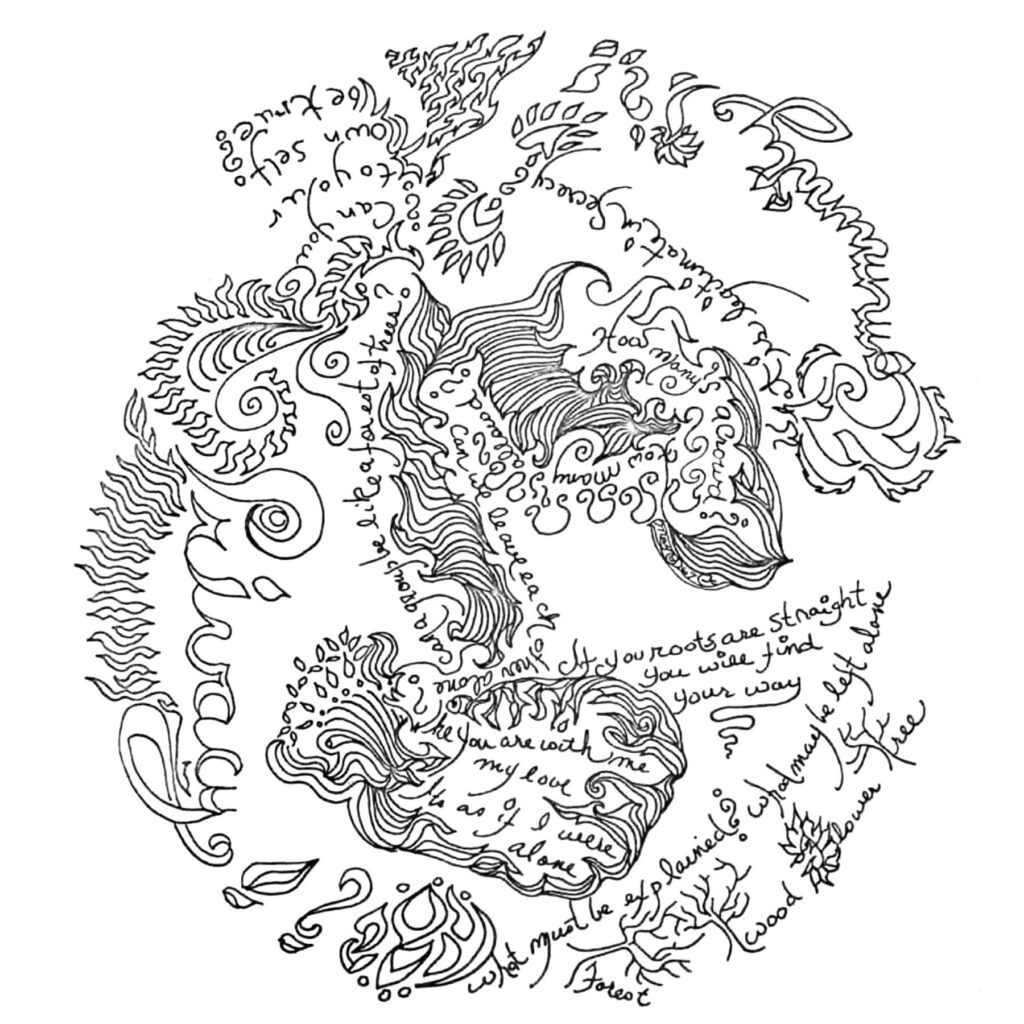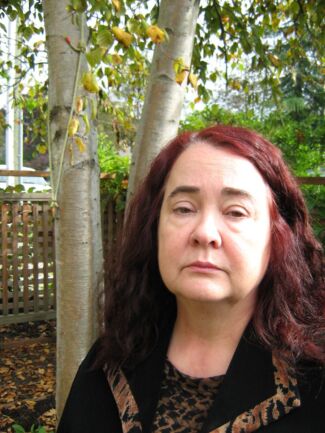An ‘artist of radical commitment’
Another Order: Selected Works
by Judith Copithorne (edited by Eric Schmaltz)
Vancouver: Talonbooks, 2023
$34.95 / 9781772015539
Reviewed by Cathy Ford
*

It is a blessing to have in one’s hand a lifeworks review collection by one of Vancouver’s most interesting, self-determining, and challenging word and visual artists. Image texts and word pictures from the late 1960s through 2019 make a satisfying survey selection of Judith Copithorne’s visual poetry–concrete and found, hybrid works of poetry and image, philosophical and political enquires, with prose and occasional works included.
The most important aspects of this gathering together are the glimpses of a contemporary feminist author who took her work, her ideas, and an artwork that explored many different formats seriously, without equivocation. The questions Copithorne faced down through all these years—challenging assumption, politics, gender bias, learned truths, and literary education, and struggles for power in her personal life and within the art’s community—are all tackled in a contemplative gaze and with accessible language.
The reader is invited to become a participant in working through social, political, economic, sexual, artistic issues, feminist and peace-work actions, and even quite private impressions and experiences. Like a surveying transit, the collection Another Order is an instrument of measure. Time flies. The lesson? Make a record of your work.

As a woman artist contributing to over fifty incredibly vibrant years in Vancouver’s literary renaissance, Copithorne used illustrative manuscript, textual interpretations, and personalized visual and spoken language art to create alternative works within a rapidly developing status quo.
The illumination of ideas Copithorne explored in her work through these years refuses to bar those uninterested in the esoteric. Her work draws the reader (or viewer), rather collaboratively, in. Effectively welcomed is the “eye of the beholder,” beheld and revealed in the artistic intent she states and explores, the intimacy of life experiences she is willing to share through her work. This is an unusual artist, without concealment or false posture. Copithorne is consistently an outlier, with a unique, purposeful, open artistic practice, and range of publications, having developed a methodology of intersectional media artistic production that seeks empowerment of word, image, connection, synopsis, and voice.

In the sense that her artistic multi-media expertise unapologetically, clearly, levers the power of disordering the assumed, or the commonplace, not just in meaning or interpretation, Copithorne is an artist of radical commitment, tempered by hard-won, revelatory thoughts, and uniquely visualized challenges. The sections in the book—from Meandering and Where Have I Been? all the way into Miss Tree’s Pillow Book and beyond—use drawing, calligraphy, typewritten and typeset lettering, brush, pen, and digital tools and techniques, toward, as expressed in “19.3.29 idea,” “discovering methods of mind outside your head.”
Published in chapbooks, pamphlets, small press issues, and magazines, as well as public in avant-garde art and dance shows, Copithorne, while not under-celebrated in these Vancouver years, is now sending voice and sensibility to a wider audience with this representative handbook/guidebook. From the beginning an artist whose work was appreciated and examined by her peers, Copithorne’s work, as so comprehensively presented in Another Order, continues to intrigue and challenge.
Life documentation is tallied and explored in several ways in this re-ordering collection. Time as well as medium are continually disrupted, observations outside or through boundaries, inter-genre “beyond the pale”—poem-drawings, aesthetic discussions, experimentation and alternative visual comprehension “frames”—all show an artist at interplay.

In her visual presentations relating picture and word—language laid on inside, around and through the pictorial—image and language are interwoven to inseparably relate to one another. Intentionally. Not just in static, set formations, but in embodied movement and energizing contemplation, as if another level of connection has been made, electrified, drawn, understood. Active meditation per illustrated page rewards, as do the poems, lyric and pictographic, “Blood and Carnations,” and “Sharkaen,” where Copithorne writes, “Words are everything compared to the trouble of / living.”
From a brilliant mind and engaged artistic exploration of literature and art, not just self-defining, but also making note and creating record of the artistic milieu all round, Copithorne creates a running recount of the city of Vancouver, its creative daily life. The sheer intellect and sharp-eyed creator in these works has given history and perspective on a time and place of artistically fevering production, forging its own way.

Some of the most important observations and expression of opinion are in the Prose and Occasional Work section of Another Order, including personal journalizing, critical thought exploration, recording of poetry events in Vancouver through the 1960s, and an interview with the author. Finally, in a section titled Surprising Writing, there is indication of where this mind and artist might yet go, exploring the validities of the autobiographical via the reverberation of feminist aesthetics and wholistic, humanist societal change. In “Blood and Carnations,” for example, birth and afterbirth imagery also brings miscarriage and abortion to mind, women’s lives, and “Life coming, going.”

My only complaint about this comprehensive selected anthologizing of the work of Copithorne is really a notation to myself as a reader, not a quarrel with the book’s design. I read the extensive introduction by dedicated editor and appreciator Eric Schmaltz at the beginning, as it is placed in the book. This introduction, academically precise and extensively notated, while surveying the vast reach of her art, acknowledges the gender bias of the atmosphere in which she worked. The introduction would have better served me as reader if held until last. Copithorne’s work, after all, always provokes one’s own ideas to the fore.
That said, the pieces of poetry selected in Another Order give an indication of the clarity of voice Copithorne leans on, full of large life questions, as in “A Light Character”: “Death, she looks like. / A fool rattles his bones. / A mind requires answers.” And the author makes room for the reader to engage, as in “Continual decisions…”—
Continual decisions which want to be heard.
The radio mutters away in the kitchen. / “Don’t waste any paper.” “Don’t blunt that
felt-tipped pen.” “After all, it’s Friday night.”
“A happy cliché.”
Room to move for an attentive reader.
Other signposts from this writer: “Affirmative Poem,” a guide to maturity of intent in artist creation; and, in “Heart’s Tide” and “February 8,” a sweetness no one should be without. Perhaps the two most important pieces in the book are “The Continuous Present” and “In Defence of Maxine Gadd.” When critiquing a book review, as a responsive letter writer, not only is Copithorne completely right about poet Maxine Gadd’s sheer brilliance, but she advises, “I urge each of you to discover her book’s virtues for yourself.” For her work throughout, clearly ahead of her own time in this resonating retrospective collection, a remark about Judith Copithorne’s Another Order could not be better said.
*

Cathy Ford is a poet, fictioniste, and memoirist working predominantly on the long poem, feminist issues, life and death concerns, social justice and peace, our relationship with this beloved earth. She has published more than fifteen books, including the art of breathing underwater (Mother Tongue, 2010), and Flowers We Will Never Know The Names Of (Mother Tongue, 2014) — an abc book of the language of flowers and their transliteration, an interpretation of grief and protest, based on the Montreal Massacre. Her earlier books are published by blewointment press, Caitlin Press, Harbour Publishing, and Véhicule Press. She lives in Sidney. [Editor’s note: Cathy Ford has reviewed books bill bissett, Jónína Kirton, and Linda Rogers for BCR.]
*
The British Columbia Review
Interim Editors, 2023-25: Trevor Marc Hughes (non-fiction), Brett Josef Grubisic (fiction and poetry) Publisher: Richard Mackie
Formerly The Ormsby Review, The British Columbia Review is an online book review and journal service for BC writers and readers. The Advisory Board consists of Jean Barman, Wade Davis, Robin Fisher, Barry Gough, Hugh Johnston, Kathy Mezei, Patricia Roy, Maria Tippett, and Graeme Wynn. Provincial Government Patron (since September 2018): Creative BC. Honorary Patron: Yosef Wosk. Scholarly Patron: SFU Graduate Liberal Studies.
“Only connect.” – E.M. Forster
One comment on “An ‘artist of radical commitment’”